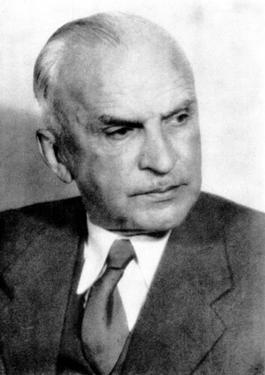Related Research Articles

Heinrich Hermann Robert Koch was a German physician and microbiologist. As the discoverer of the specific causative agents of deadly infectious diseases including tuberculosis, cholera and anthrax, he is regarded as one of the main founders of modern bacteriology. As such he is popularly nicknamed the father of microbiology, and as the father of medical bacteriology. His discovery of the anthrax bacterium in 1876 is considered as the birth of modern bacteriology. Koch used his discoveries to establish that germs "could cause a specific disease" and directly provided proofs for that germ theory of diseases, therefore creating the scientific basis of public health, saving millions of lives.

Paul Ehrlich was a Nobel Prize-winning German physician and scientist who worked in the fields of hematology, immunology, and antimicrobial chemotherapy. Among his foremost achievements were finding a cure for syphilis in 1909 and inventing the precursor technique to Gram staining bacteria. The methods he developed for staining tissue made it possible to distinguish between different types of blood cells, which led to the ability to diagnose numerous blood diseases.

Victor Babeș was a Romanian physician, bacteriologist, academician and professor. One of the founders of modern microbiology, Victor Babeș is author of one of the first treatises of bacteriology in the world – Bacteria and their role in pathological anatomy and histology of infectious diseases, written in collaboration with French scientist Victor André Cornil in 1885. In 1888, Babeș underlies the principle of passive immunity, and a few years later enunciates the principle of antibiosis. He made early and significant contributions to the study of rabies, leprosy, diphtheria, tuberculosis and other infectious diseases. He also discovered more than 50 unknown germs and foresaw new methods of staining bacteria and fungi. Victor Babeș introduced rabies vaccination and founded serotherapy in Romania.

Friedrich August Johannes Loeffler was a German bacteriologist at the University of Greifswald.

The Gottfried Wilhelm Leibniz Prize, or Leibniz Prize, is awarded by the German Research Foundation to "exceptional scientists and academics for their outstanding achievements in the field of research". Since 1986, up to ten prizes have been awarded annually to individuals or research groups working at a research institution in Germany or at a German research institution abroad. It is considered the most important research award in Germany.

Stanislaus Josef Mathias von Prowazek, Edler von Lanow, born Stanislav Provázek, was a Czech zoologist and parasitologist, who along with pathologist Henrique da Rocha Lima (1879-1956) discovered the pathogen of epidemic typhus.

Carl Jakob Adolf Christian Gerhardt was a German internist born in Speyer.

Carl Georg Friedrich Wilhelm Flügge was a German bacteriologist and hygienist. His finding that pathogens were present in expiratory droplets, the eponymous Flügge droplets, laid ground for the concept of droplet transmission as a route for the spread of respiratory infectious diseases.

Felix Victor Birch-Hirschfeld was a German pathologist who was a native of Kluvensieck bei Rendsburg.

Fred (Friedrich) Neufeld was a physician and bacteriologist who discovered the pneumococcal types. This discovery led Fred Griffith to show that one pneumococcal type could be transformed into another. Subsequently, Oswald Avery demonstrated that the transforming substance was DNA. All modern molecular biology has evolved from this work.

Karl Bernhard Lehmann was a German hygienist and bacteriologist born in Zurich. He was a brother to publisher Julius Friedrich Lehmann (1864–1935).

Bernhard Sigmund Schultze; sometimes spelled Bernhard Sigismund Schultze was a German obstetrician and gynecologist. He was a younger brother to anatomist Max Schultze (1825–1874).

Friedrich Karl Wilhelm Dönitz or Doenitz was a German physician, anatomist, zoologist, and entomologist. He described numerous species of insects, ticks and worked for thirteen years in Japan where he was a professor of anatomy while also serving as the first forensic physician there.

Rudolf Kraus was an Austrian pathologist, bacteriologist and immunologist known for his work with bacterial precipitins.
Ernst Hallier was a German botanist and mycologist.
Experimental Bacteriology: in Its Applications to the Diagnosis, Epidemiology, and Immunology of Infectious Diseases is a textbook on bacteriology and infectious diseases. It was one of the most authoritative works in medical microbiology in the first half of the 20th century.
Heinrich Hetsch was a German physician and microbiologist. He is known as the original author, with Wilhelm Kolle, of the famous book Experimental Bacteriology, one of the most authoritative works in microbiology in the first half of the 20th century.

Hans Otto Friedrich Schlossberger was a German physician, who was known for his research in immunology, medical microbiology, epidemiology and antimicrobial chemotherapy, especially on syphilis, typhus, gas gangrene, diphtheria, erysipeloid of Rosenbach, tuberculosis, malaria and leptospirosis. He was one of the leading immunologists and bacteriologists of Germany during his lifetime, and was a student and collaborator of the Nobel laureates Paul Ehrlich and Emil von Behring, two of the principal founders of the field of immunology.

The Department of Medical Microbiology, formerly known as the Department of Bacteriology or the Institute of Bacteriology, was a research department of the pharmaceutical company Schering AG.
Georg Jochmann was a German internist and bacteriologist, who specialized in infectious diseases.